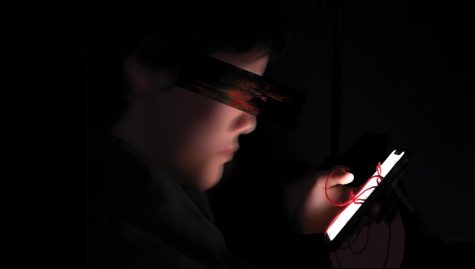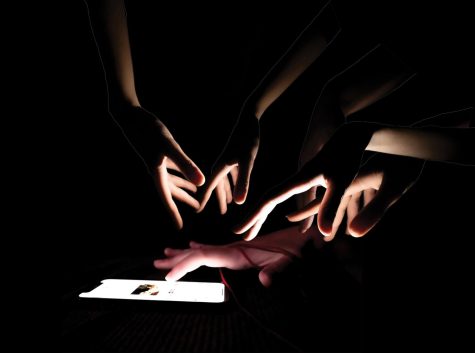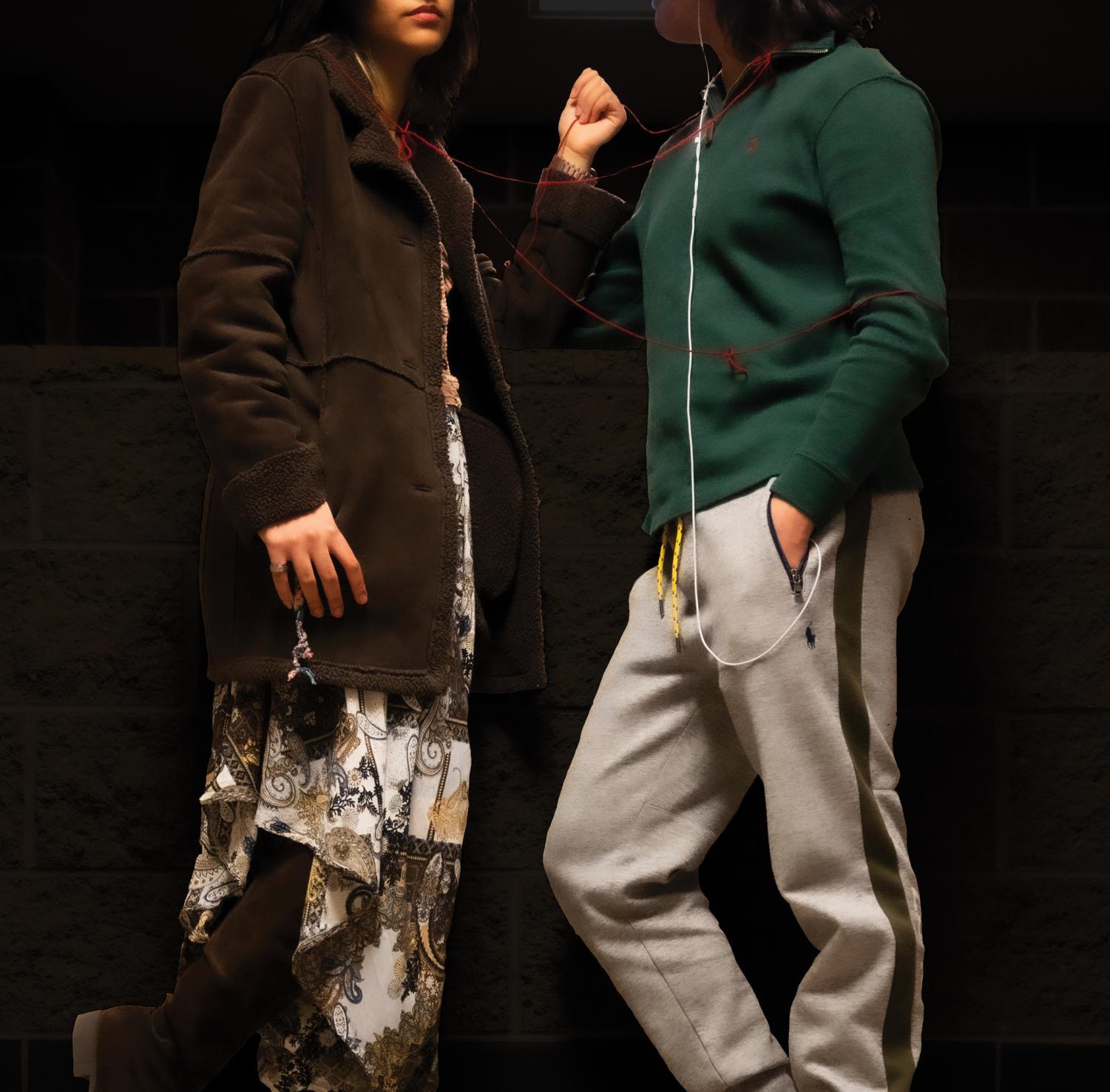Your donation will support the student journalists of West High School. Your contribution will allow us to purchase Scholarship Yearbooks, newsroom equipment and cover our annual website hosting costs.
(No) strings attached
Social media has produced a new age of hookup culture that perpetuates pressure and gender expectations.
March 2, 2023
Though the nuances of the definition vary from person to person, hookup culture can best be characterized as a vague term used to describe a culture that normalizes casual sexual relations that lack emotional connection and commitment. Media plays a central role in shaping hookup culture in the West High community.
Media
Digital connection has become essential to teenagers’ interactions and relationships. According to a survey conducted by Pew Research Center from April 14 to May 4, 2022, 97% of U.S. teenagers aged 13-17 say they use the internet daily.
With increasing internet use among younger generations comes a heightened connection to media and pop culture, including references to hookup culture. A 2005 study by the Kaiser Family Foundation found that 70% of 959 prime-time television shows contained sexual content. The trend of sexual media content continues today.
“A lot of folks tend to think more people are hooking up than actually are, often based on distorted norms or messaging we get from media: movies, TV shows and songs,” Sylvia Mikucki-Enyart, Associate Professor in the Department of Communications Studies at the University of Iowa, said. “Media gives the impression that hooking up is normative, and those who don’t hook up are losers or are unwanted and unattractive. People often think that media reflects reality, so they want to keep up with others.”
Further, positive portrayals of hookup culture on social media exacerbate unrealistic expectations, as noticed by one West High anonymous student source.
“[Hookup culture] is so romanticized on social media, especially in our generation,” an anonymous source said.

According to the American Academy of Child and Adolescent Psychiatry, as of 2018, 90% of teens under 18 report having used social media. Social media increases the number of people one interacts with and can help connect people from different schools who wouldn’t have interacted otherwise.
“Especially with apps like Snapchat, it’s so easy to connect with people,” an anonymous source said. “Talking to people you don’t know as well and don’t have an emotional connection with online is much less scary than it is in person.”
For some, social media has eliminated the need to communicate in person about hooking up.
“You’re not going to talk to someone about a hookup in person. That’s weird,” an anonymous source said. “[It’s not] weird on Snapchat.”
However, this new way of initiating sexual relations can create more risks for those involved.
“[Social media has] created a new opportunity for people, but also new opportunities for folks to exploit that,” Amber Powell, UIowa Assistant Professor of Sociology and Criminology, said.
[Social media has] created a new opportunity for people, but also new opportunities for folks to exploit that.
— Amber Powell, UIowa Assistant Professor of Sociology and Criminology
“So people will talk about how we give consent in the digital age. If you send a photo to someone, whose property is that? Is that still your property? If they show it to somebody, is that a violation of your consent?”
Snapchat is a common social media platform for facilitating hookup culture, with about 60% of teenagers using it.
“I feel like Snapchat is the biggest platform to [start a] hookup because it’s erased. There is no evidence — it’s gone. Those kinds of platforms really affect the hookup culture, especially if it goes wrong,” an anonymous source said.
The ability to delete or hide pictures and messages can be abused. One anonymous source believes the Snapchat feature, My Eyes Only, encourages privacy breaches. My Eyes Only, password-protected Snapchat memories, creates a way for people to hide photos and videos. The anonymous source has seen My Eyes Only used to conceal sex videos taken without consent, often the other person never knowing they were filmed.
Additionally, people may use threats of leaking sex videos or nudes to put the victim in a place where they feel pressure to act casually about the situation.
“You just have to deal with it because you don’t want to make a big scene,” the anonymous source said. “It’s so hard to speak up.”
Iowa law states that intentionally filming or photographing a person without consent for sexual gratification is an invasion of privacy. Anyone who is found guilty of violating this law can face up to two years of jail time and a fine of $6,250. However, the expectation to be quiet about blackmail makes some people feel as though the perpetrators will continue to get away with it as they face no consequences.
“I feel like no one calls them out,” one anonymous source said. “Even all their friends know that they’re recording. They all know that it’s in their My Eyes Only, but they don’t say a thing. They probably know it’s wrong, but they don’t speak up. So it continues.”
Pressure
Comparing oneself to others has a clear correlation with problematic social media use on Instagram, Snapchat, TikTok, Twitter and Facebook, according to an August 2022 study by researchers at Michigan State University and the University of Delaware.
Since increased social media use can lead to increased self-comparison, when one sees that others are participating in hookup culture, they may feel pressure to hook up as well. An anonymous source describes this experience.
“[Social media] normalizes [hookups] for me and other people,” the anonymous source said. “‘If other people are doing it, it’s not weird if I do it,’ or ‘if other people are doing it, shouldn’t I be doing it?’ type of thing.”

UIowa Associate Professor of Instruction and Director of Undergraduate Studies of Sociology Jennifer Haylett believes hookups can be an attractive alternative to relationships. One can satisfy their sexual desires without taking away the time and focus required for an intimate relationship.
“Relationships can be greedy of our time and our attention and not jumping into one that’s so serious early on can have some benefits,” Haylett said. “It can be a satisfying alternative to relationships, and people can find that it actually increases their self-esteem [when] they feel like it matches their particular interests.”
One anonymous source explains how brief, purely sexual encounters can be appealing after a breakup, as one may not want to make another long-term commitment for a while.
“If you’re in a relationship and then heartbroken, and you don’t want to do a relationship ever again, you’re gonna start hooking up with people because it’s fun. You’re just looking for excitement,” the anonymous source said.
However, another anonymous source reveals how transitioning from a trusting relationship to hookups can be risky.
“When you’re in a relationship with someone, you form a deeper connection and hopefully you trust the person,” the anonymous source said. “But, with someone you’re just hooking up with, there’s no way for you to tell if they’re lying about how many people they’ve had sex with or if they have an STD … There’s just so much room for lies.”
Additionally, one anonymous source reflects on how following a hookup, the dynamic between the two parties involved can change negatively.
“Before the hookup, I feel like the guy calls you pretty, talks to you, compliments you and Snap[chat]s you all the time, but then after, it’s like they already got you — they got what they wanted,” the anonymous source said. “It’s just a very different dynamic; it feels like they don’t try anymore.”
The source discloses that hookups can make it difficult to be emotionally vulnerable and open to exploring romantic feelings.
“It’s hard to let your guard down and get into an actual relationship once you’ve experienced hookups because it twists how you form an original connection,” the anonymous source said. “You’re always scared that it’s just gonna be a hookup and not anything more.”
You’re always scared that it’s just gonna be a hookup and not anything more. — Anonymous West student
Another anonymous source details an unwanted outcome they faced after their only hookup.
“After you engage in your first hookup, people just think you’re all about that. I feel like that’s what happened to me,” the anonymous source said. “The word got out, and then I just got hit left and right with [people thinking that’s what] I’m all about. When in reality, no — I would never want to experience that ever again.”
Along with the stigma of hookups, high school gossip can create a toxic environment for both those engaging and not engaging in hookup culture.
“When I used to talk to this one guy, I didn’t do the stuff [he] expected me to do. His friends would literally call me over at lunch and be like, ‘Why aren’t you giving him [oral sex]?’” an anonymous source said. “It really puts you in an uncomfortable situation, and then you think, ‘Oh, am I supposed to do this kind of stuff? Am I expected to do this kind of stuff even if I don’t want to?’”
It really puts you in an uncomfortable situation, and then you think, ‘Oh, am I supposed to do this kind of stuff? Am I expected to do this kind of stuff even if I don’t want to?’
— Anonymous West student
Despite feeling uneasy with hookups, the anonymous source comments on the inherent fear of not belonging as the reason for many deciding to participate in hookup culture in high school.
“Who doesn’t want to fit in, have friends, and go to social events and be in the front row, or be recognized or be welcomed?” the anonymous source said. “A lot of times, we’re just so scared that if we say no — if I don’t do certain things — I’ll be excluded from that.”
Yet, in spite of social pressure, the anonymous source realized they only want to be in a committed relationship.
“I want to find someone whom I really like and have an emotional connection [with] and actually get to know that person, but I feel like a lot of times that’s not what [high schoolers are] looking for,” the anonymous source said. “It’s really hard to find a person who actually has the same values as you.”
An anonymous source who has been in a relationship for about two years gives advice to anyone who is looking for commitment instead of a no-strings-attached agreement.
“I would say just give it time. The right person will come along, and in the meantime, focus on yourself because loving yourself will make your future relationship so much better,” the anonymous source said. “Also, always trust yourself. If someone is moving too fast for you or making you uncomfortable, you have every right to leave that situation to protect yourself.”
Gender
Experiences with hookup culture can differ greatly for many reasons, one of the most prominent being gender.
“From my experience, it seems like guys are more likely to be the ones to initiate hookups,” an anonymous source said. “I feel like girls are more likely to want something more from it. Whereas [with] guys, it’s just a hookup, and then you’re done.”
Another anonymous source feels that men’s intentions are often misunderstood.
“In hookups in general, the guy is more painted as a bad guy instead of the girl. It’s like guys only want one thing, but girls can want the same thing as well,” the anonymous source said.
Haylett has observed how gender stereotypes can cause miscommunications within hookups.
“I think what we end up doing is having men and women hooking up and performing those expectations,” Haylett said. “They assume, as a woman, I’m supposed to want more or the man assumes she’s going to want more. [The guy] may be trying to play it cool, like he doesn’t [want a relationship] but he does.”
These preconceived notions in hookup culture stem from stereotypes surrounding gender and emotional expression. According to scientific journal Frontiers in Psychology, stereotypes bring a consistent pattern of different emotional expressions between genders: men tend to express powerful emotions, such as anger, with less tolerance for vulnerable emotions, like sadness, while women are the opposite.
“Boys tend to feel pressured to hook up to prove their masculinity and gain status,” Mikucki-Enyart said. “However, hookups, which often lack communication, aren’t really fertile grounds for developing sexual skills and competency. Hookup culture encourages [boys] to deny feeling an emotional connection ever and that acknowledging emotions is bad.”
Similarly, women deal with double standards. Mikucki-Enyart has observed these negative expectations.
“Girls often engage in hookups because they feel like they have to if they flirted or it’s just ‘what you do,’” Mikucki-Enyart said. “Unlike boys, who are praised for hooking up [by] peers, girls must tread a fine line of not seeming too prudish or too slutty when engaging in hookup culture. Girls lose status for hooking up, whereas boys gain status.”
Unlike boys, who are praised for hooking up [by] peers, girls must tread a fine line of not seeming too prudish or too slutty when engaging in hookup culture. — Sylvia Mikucki-Enyart, UIowa Associate Professor in the Department of Communication Studies
An anonymous source notices the disparities between gender expectations at West.
“If a guy has a lot of [sexual relations, peers say], ‘Oh my gosh, you are the king; you can get anyone you want,’” the anonymous source said. “But if a girl does it, she’s a slut, she’s a whore, she belongs in the streets.”
Powell describes how society often views women as the ones ultimately responsible for any consequences of sexual acts they partake in.
“The gender hierarchies we have certainly [imply] women are responsible for sexual gatekeeping — they’re the ones who are sort of responsible for controlling men’s uncontrollable impulses,” Powell said. “But if they fail at that, then we slut-shame them and say they’re making it up and so on.”
Slut-shaming is the act of condemning someone, often a woman, for sexual behavior deemed indecent. Powell notes that slut-shaming occurs not only in hookup culture but also overlaps with rape culture, an environment where sexual violence is normalized and excused.
“The questions that we ask in rape culture are: ‘Why was she wearing that? Why would she be drinking with them anyways? Shouldn’t she know that if she does this, then this is gonna happen?’ Whereas we’re not asking these questions [like] ‘Why is he assaulting her?’” Powell said. “It’s an environment where we blame victims and hold them responsible for their own assault and don’t allow them to safely report — to seek justice and accountability for things that have happened to them.”
Powell believes early education is crucial to disband rape culture.
“I think the best thing is early sex education and even before sex education, consent education,” Powell said. “It warms my heart now to see a movement even in elementary schools where people … talk about boundaries and respecting those boundaries. I think that’s a really good way to start.”
I think the best thing is early sex education and even before sex education, consent education.
— Amber Powell, UIowa Assistant Professor of Sociology and Criminology
In order to overcome gender stereotypes and the stigmas surrounding hookups, Mikucki-Enyart advises creating safe spaces to encourage open conversations.
“These conversations do not have to be weird or awkward,” Mikucki-Enyart said. “We as a society make them so, but when you make them part of everyday normal conversation, we take the stigma and potential secrecy out of sex.”

